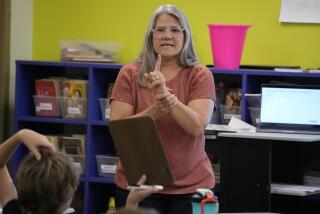Rethink the Aptitude Excuse
- Share via
The achievement problems in U.S. schools can be seen clearly at our border. Juarez, Mexico and El Paso, Texas, are about a mile apart, separated by the Rio Grande. For years, one of my former doctoral students was on the faculty of the University of Texas at El Paso and directed the remedial center. Students who were having trouble in a variety of subjects, including mathematics, came to the center for tutoring by undergraduates and graduate students. In reviewing who was hired by the center over a number of years, she observed that Americans were rarely hired to tutor in math. Rather, most math tutors came from Mexico, Malaysia and India. Most of the Mexican tutors came from Juarez. While it’s possible that those Mexican tutors were from the more affluent sector of Juarez, it appeared that a young person who went through the Juarez school system emerged with a much better knowledge of mathematics than the same young person would if he or she attended school a mile away in the U.S. In fact, teachers from Juarez were training teachers from El Paso about mathematics instruction.
Sadly, American students consistently perform dismally in international assessments of educational achievement. Perhaps the most important finding to emerge from such international comparisons is this: When American students do poorly, parents and teachers attribute this failure to low aptitude. When Japanese students do poorly, parents and teachers conclude that the student has not worked hard enough. A colleague who is a math professor in China noted that virtually everybody there learns advanced mathematics, while only a few students do in the United States. In China, he said, it’s assumed that everyone can master advanced concepts, and they’re expected to do it. America, he said, had a “strange concept of aptitude.”
One scholar has suggested that learning to drive provides the best metaphor for science and mathematics education. As they approach the age of 16, teenagers can hardly contain their enthusiasm about driving. We assume, of course, that they will master this skill. Some may fail the written test or the driving test once, twice or three times, but soon they all will be driving. Parents and teachers don’t debate whether a young person has the aptitude to drive.
But negative expectations about academic aptitude often erode students’ self-confidence and lower their aspiration levels. Since many people erroneously attribute low aptitude for mathematics and science to women, minorities and the poor, this domino effect increases the gap between the haves and the have-nots in our country.
I examined a national sample of college students who were asked to rate their own ability in mathematics. The top category was “I am in the highest 10% compared with other students my age.” I studied only those students who clearly were in the top 10%, based on their scores on the quantitative portion of the SAT. Only 23% of the women who actually were in the top 10% believed that they were.
The book “The Bell Curve” contributed to this destructive sequence. The authors contend that African Americans are less intelligent and therefore some educational opportunities may be wasted on them. But groups that have been identified as “uneducable” through intelligence testing in one society and time excel in another.
It is neither too late nor impossible to turn this situation around. Exciting research about how people learn math was carried out by Uri Treisman at UC Berkeley. He observed that African American students performed poorly in calculus while Chinese students excelled. He did not accept the conventional wisdom that the African Americans’ low achievement was due to their parents’ poverty or the poor schools they attended. He thought perhaps it had to do with how they studied. So Treisman spent many months observing the Chinese students. He found they spent longer hours studying than other students and that they frequently studied together in groups, for example, working out extra homework problems as a group. Treisman then developed an experimental workshop in which he replicated these study patterns with the African American students. The African American students went on to excel in calculus. In fact, Treisman found that, at a given SAT performance level, his African American workshop students consistently out-performed both Anglos and Asians.
A central component of the workshop approach was to stretch the students to excel by giving them extra, advanced problems. Many of them were high school valedictorians who, understandably, had resented and rejected remediation. In short, the students were treated like the winners they could be, not like helpless losers. In a follow-up study, Martin Bonsangue and I reported similar dramatic positive effects for a calculus workshop program at Cal Poly Pomona in which the majority of students were Latino.
What can we do about this? Set high standards. Expect every student--women, minorities and the poor included--to be able to learn mathematics and science as well as they can learn to drive. Encourage them. Tell them not to believe the aptitude excuse.






